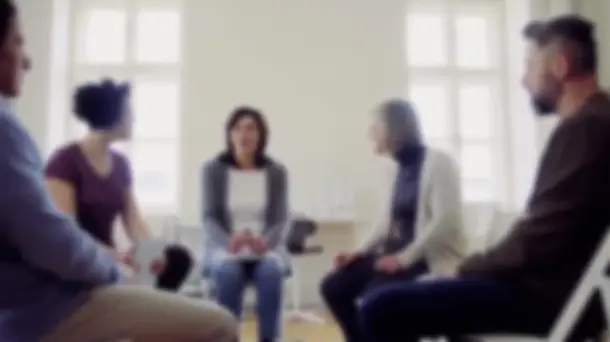Welcome to Narcotics Anonymous
What is our message? The message is that an addict, any addict, can stop using drugs, lose the desire to use, and find a new way to live. Our message is hope and the promise of freedom.

“When new members come to meetings, our sole interest is in their desire for freedom from active addiction and how we can be of help.”
It Works: How and Why, “Third Tradition”
Is NA for me?
This is a question every potential member must answer for themselves. Here are some recommended resources that may be helpful:
Need help for family or a friend?
NA meetings are run by and for addicts. If you're looking for help for a loved one, you can contact Narcotics Anonymous near you.
Subscribe to NAWS Emails
Sign up to receive Just for Today and SPAD daily meditation emails, as well as NAWS News, NAWS Updates, and more.
Never before have so many clean addicts, of their own choice and in free society, been able to meet where they please, to maintain their recovery in complete creative freedom.
Basic Text, “We Do Recover”
Recovery Quicklinks:
Service Quicklinks:
Narcotics Anonymous sprang from the Alcoholics Anonymous Program of the late 1940s, with meetings first emerging in the Los Angeles area of California, USA, in the early Fifties. The NA program started as a small US movement that has grown into one of the world's oldest and largest organizations of its type.
Today, Narcotics Anonymous is well established throughout much of the Americas, Western Europe, Australia, and New Zealand. Newly formed groups and NA communities are now scattered throughout the Indian subcontinent, Africa, East Asia, the Middle East, and Eastern Europe. Narcotics Anonymous books and information pamphlets are currently available in 49 languages.
Information About NA
Daily Meditations
Just for Today
March 01, 2026 |
Anxiety attack? |
| Page 63 |
| “[The] Power that brought us to this program is still with us and will continue to guide us if we allow it.“ |
| Basic Text, p. 27 |
| Ever had a panic attack? Everywhere we turn, life's demands overwhelm us. We're paralyzed, and we don't know what to do about it. How do we break an anxiety attack? First, we stop. We can't deal with everything at once, so we stop for a moment to let things settle. Then we take a “spot inventory” of the things that are bothering us. We examine each item, asking ourselves this question: “How important is it, really?” In most cases, we'll find that most of our fears and concerns don't need our immediate attention. We can put those aside, and focus on the issues that really need to be resolved right away. Then we stop again and ask ourselves, “Who's in control here, anyway?” This helps remind us that our Higher Power is in control. We seek our Higher Power's will for the situation, whatever it is. We can do this in any number of ways: through prayer, talks with our sponsor or NA friends, or by attending a meeting and asking others to share their experience. When our Higher Power's will becomes clear to us, we pray for the ability to carry it out. Finally, we take action. Anxiety attacks need not paralyze us. We can utilize the resources of the NA program to deal with anything that comes our way. |
| Just for Today: My Higher Power has not brought me all this way in recovery only to abandon me! When anxiety strikes, I will take specific steps to seek God's continuing care and guidance. |
A Spiritual Principle a Day
March 01, 2026 |
Self-Acceptance and Our Sense of Belonging |
| Page 63 |
| “We learn to accept and love who we are whether or not we feel like we \'match\' the people around us.“ |
| Living Clean, Chapter 2, |
| For so long, we wanted to be anyone else because we were uncomfortable in our own skin. Many of us felt like we didn\'t fit in anywhere. And it\'s no different when we first get to NA. We compared our insides to the outward appearances of others and drew the usual conclusions. All we could see were the differences–and no one looked like we felt. Not that we had a firm grip on who we were or even how we felt.
As we observe in Living Clean, \”. . . our identity was built on fantasy: who we could be, would be, should be, or even who we used to be.\” With precious little self-knowledge, it was difficult to build the bonds of human connections. Our ability to share with or relate to others was limited at best. We justified keeping other members at arm\'s length with assumptions based on old thinking and outward appearances. The outsides were what seemed to matter most. One member shared, \”I shielded the scared little girl inside with spikes and leather. I looked for others with similar armor, thinking maybe we could be alone together.\”
In recovery, we learn to act our way into better thinking. We begin by emulating people we admire and picking up new behaviors that seem to fit. We do the next right thing, knowing that we don\'t have to feel okay to be okay. We learn to practice love as a spiritual principle by simply listening to our fellow members.
Sometimes, we learn to love and accept others as they confront their greatest challenges–the new member, the recent widow, the cancer survivor, the parents fighting for custody of their children. We relate to their insides: their grief, their struggle, their vulnerability as they share their pain. Moments like these bring us back to humanity. The conditions of our own brokenness may have been vastly different, but we connect based on feelings.
We let go of our old ideas about fitting in or \”matching\” those around us. The basis for our connections shifts to higher ground. Who needs to fit in when we belong? We learn to practice love and acceptance of ourselves and others a little more fully in this safe harbor of belonging. |
| ——— ——— ——— ——— ——— |
| I will examine my ideas about fitting in and discard some old thinking. Today I will practice the principle of love by looking for opportunities to connect with other members. |
Do you need help with a drug problem?
“If you’re new to NA or planning to go to a Narcotics Anonymous meeting for the first time, it might be nice to know a little bit about what happens in our meetings. The information here is meant to give you an understanding of what we do when we come together to share recovery…”
Subscribe to NAWS Emails
Sign up to receive NAWS Updates and NAWS News emails as well as Just for Today and SPAD daily emails.



